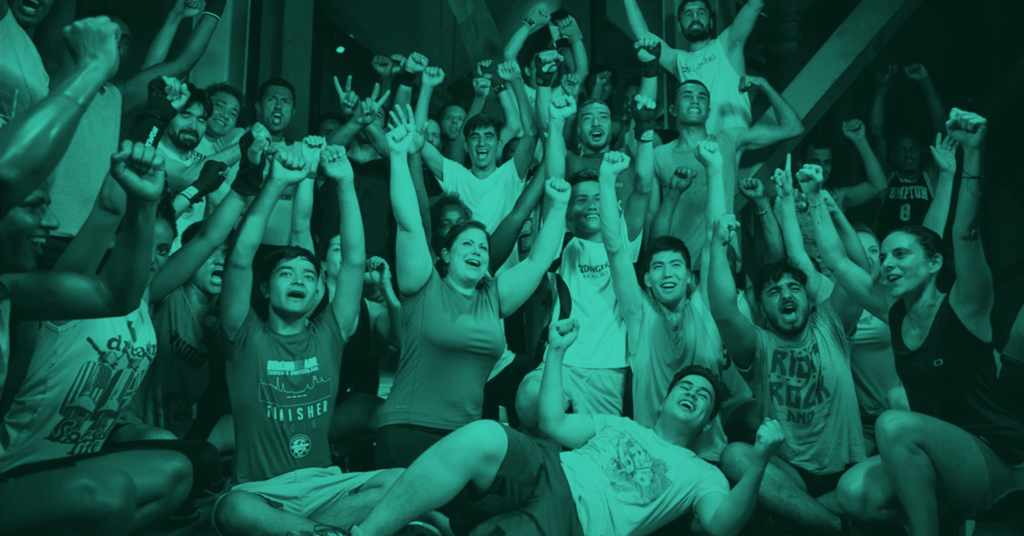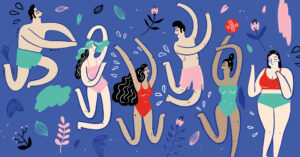Annina Maria Largo is a lawyer by formation, a Fitbox teacher and the president of SPORTEGRATION, an association she founded in the summer of 2016. The association offers free sports classes to refugees. The driving force of this organisation is to enable people from different backgrounds to meet, have an exchange and build a community through sports.
Why did you start SPORTEGRATION?
That’s a good question, sometimes I wonder what am I doing here?! She says laughing
In 2015-2016 the refugee topic was all over the newspapers. I was pondering on how to contribute and while I was giving a class at the gym, the idea popped up: “Why not offer free classes to young refugees?”. I decided to give it a 1-2 months try: having an association was not in my plans.
I called 2-3 asylum centers, met two social workers and spread the news about the free class: the first time over 20 people showed up! We then grew quite quickly: whoever came, told their friends and that’s how it all started. Today we have around 400 different people per month (250 different people per week) and we offer around 35 training sessions per week.
As the name already says, SPORTEGRATION also seeks to help refugees integrate in Switzerland. We work with people who are waiting for a decision that will affect their whole life and future. Although the system changed in March 2019 and now an answer needs to be given in 6-12 months (before it could take years). Some people arrived here before 2019 (many young people came here in 2015 and 2016) and are still waiting for their answer.
The aim is to have Swiss people and expats participate in the classes, in exchange for a small contribution. They used to represent ¼-⅓ of the participants, but Covid has complicated the situation. When we are able to give classes, we prioritize the refugees. However we will combine them again as soon as we are not limited anymore.
80% of our activities are different kinds of sports (over 13 different kinds of sports). We have over 140 active volunteers, 10-15% of which are refugees. The idea is to show them how things work and let them contribute, because not only they want to, but most are very good at it.
For example, Najib joined SPORTEGRATION 4 years ago, he’s 21-22 now. He is from Afghanistan and used to work in Iran. When he arrived, he had never been to school and did not even know how to count, so he first attended SPORTEGRATION’s basic math course and also joined a lot of sports classes. As he was very talented, I once asked him to help me give the training warmup. At first he stuttered and shied away, so we agreed I would tell people what to do and he would demonstrate. After a while, he gained confidence and started doing it alone. Now, 6 months later, he is teaching boxing classes by himself.
Besides sports, since more than a year he is also in his apprenticeship: he recently got a little raise and his employers told me “we need more Najib’s because he’s doing a really great job”. I look back four years and compare to now: he’s confident, knows what he does, is learning, working and teaches at SPORTEGRATION. Isn’t that amazing?
The other 20% of our activities include basic school courses, such as German, Computer and Maths classes. We also have a 1:1 mentorship program, where we are always looking for additional mentors. We also work with corporates as part of their corporate social responsibility programs by offering mentorship programs for their employees.
SPORTEGRATION is always there for me to help, with tickets, letters and many important things and information. It is for me, my home and my family.
Desbele, 22 years old from Eritrea
What would help you?
My vision and dream would be to be able to offer classes in other places: due to their condition and lack of finances, refugees cannot move around, so we need to go to them. At the moment, we focus on the Canton of Zurich but we are currently considering a pilot project in Bern.
More funds would therefore help to scale the project, reaching other cities, more people and ultimately having a bigger impact.
Associative work mainly depends on funding, which makes it hard for us to plan. We never know if funding will be renewed or granted. I think one of the biggest issues when it comes to this line of work is that, in 90% of the cases, foundations want to finance a good idea at the very beginning, but it doesn’t last long before they move on. Fortunately, we succeeded in gaining the support from certain foundations that offered to support us on a more regular basis, which is of extraordinary value for us.
SPORTEGRATION for me is like a home, especially when I get overwhelmed. It has been there for me when I was feeling lost in life and I met many curious and like minded people. It has provided me and many others with opportunities. And that’s what I love about SPORTEGRATION, it does not give up on helping people and it brings out the best in each person. No matter what, no matter when and no matter how, they will always be there.
Nataly, 25 years old from Bolivia
I asked her to tell me another one of her favorite stories and she proceeded talking about Abdullah
Abdullah, came here by himself from Afghanistan when he was only 14. He, like many others, fled his country, traumatized, first by the war and then by the journey itself. He is now in the second year of his apprenticeship, keeping his positive attitude, not only receiving very good grades in economics but also always happy to help others. It is incredible to see everything that he has achieved, especially after everything he has lived through.
It’s all about love, people who surround you and how they support you. There is very little help for people who are still in ongoing asylum proceedings but also for those who have been temporarily permitted to stay in Switzerland. They are in dire need of connecting socially. Depending on the residence permit, they are barred from working and due to financial constraints it is often very difficult for them to participate in courses. It’s such a waste of time and potential for everyone.
I know I can’t change the system, but I try to make their wait and conditions a little bit better. There are a lot of willing and talented people, they just need to be given the possibility.
If you want to contribute, participate or mentor, please head to the association website or contact directly info@sportegration.ch
P.S. For more initiatives connected to helping refugees integrate, embrace their potential and thrive, read also our interview with Christian Hirsig, founder of Powercoders, whose motto is “Impact lives by teaching how to code”





